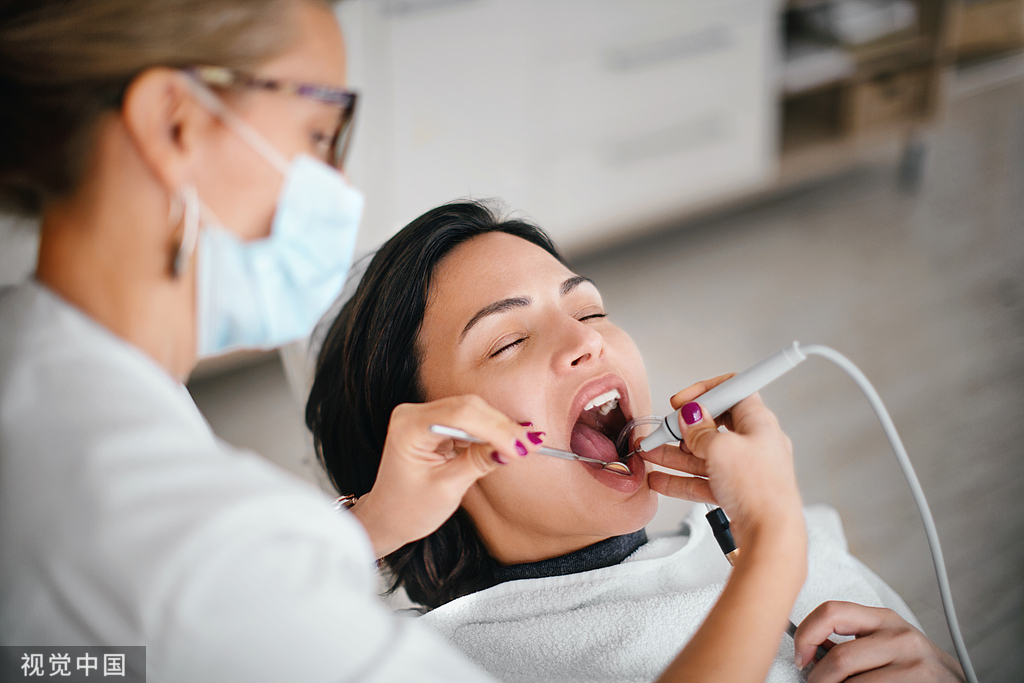
Oral health is not just about having a beautiful smile; it is a cornerstone of overall health and can significantly impact our quality of life. Dental caries and periodontal diseases, both bacterial infections, threaten not only oral health but also general well-being.
Moreover, gum bleeding may not always be a simple oral inflammation; it could be a symptom of blood diseases like leukemia or hemophilia, or systemic conditions such as liver cirrhosis, peptic ulcers, diabetes, or vitamin deficiencies. It is essential to seek medical attention for gum bleeding.
The Myth of Tooth Cleaning Damaging Teeth
The principle of ultrasonic teeth cleaning involves the use of ultrasonic vibrations and water mist to efficiently remove tartar. The smooth working end of the ultrasonic scaler does not cut or grind, eliminating the concern of tooth wear.
Bleeding during teeth cleaning may occur due to the slight irritation caused by ultrasonic vibrations. Healthy gums rarely bleed during cleaning, but inflamed, irritated gums due to long-term tartar buildup are more prone to bleeding. Fortunately, after teeth cleaning, the removal of local irritants allows gums to recover quickly. It is generally recommended to have teeth cleaned every six months to a year.
Mouthwash as a Substitute for Brushing
Mouthwash can kill some harmful oral bacteria and freshen breath, but it cannot thoroughly clean teeth. It can only remove food debris and some surface plaque bacteria, not the plaque attached to the gum grooves, interdental spaces, or tooth surfaces. Prolonged use of some medicinal mouthwashes can disrupt the oral bacterial ecosystem, causing oral mucosal diseases or tooth discoloration, so long-term use is not advised. Proper brushing and flossing are the foundations of maintaining oral hygiene.
Brushing Immediately After Meals
Brushing right after meals can remove food debris and plaque promptly, but it may increase the risk of tooth sensitivity. After eating, especially fruits or carbonated drinks, acidic substances in the mouth can erode the hard enamel, making it susceptible to wear. It is advisable to rinse the mouth immediately after meals and brush teeth 10 to 20 minutes later.
Brushing to Remove Plaque
Brushing can remove plaque, but it cannot eradicate it entirely. Oral bacteria reproduce continuously, and plaque can reattach to clean tooth surfaces within hours, especially at night when saliva production decreases, and the oral self-cleaning action is poor. Therefore, it is essential to brush teeth at least 2 to 3 times a day, with the evening brushing being particularly important.
Seeking Dental Care Only for Toothache
Many people only visit the dentist when they experience toothache or明显的 oral problems. However, regular dental check-ups are crucial for preventing oral diseases and detecting issues early.
It is generally recommended that adults have at least two oral examinations per year, preferably every six months, to timely identify and address potential oral health issues. Children and adolescents, who are in their growth and development stage and more susceptible to various oral problems, require more frequent dental check-ups.
Teeth Whitening Products for Everyone
Individuals with gingivitis, periodontal disease, dental caries, or teeth sensitivity should address these issues before starting teeth whitening. Minors, pregnant and nursing women should avoid using teeth whitening products. People with chronic diseases like heart conditions or epilepsy should choose appropriate whitening options under professional medical guidance.
The Importance of Cleaning Dentures
After daily meals, food debris and plaque can accumulate on dentures, and microorganisms can adhere to their surfaces. Inadequate cleaning can shorten the lifespan of dentures and lead to serious oral and systemic diseases. Proper care is essential for patients with dental prostheses.
It is recommended to remove removable dentures after meals for rinsing or brushing with toothpaste and a brush, followed by rinsing the mouth with warm water before wearing them again. Regular use of denture cleaning tablets for cleaning dentures is also important, as is the daily brushing of any remaining natural teeth in the mouth.
By avoiding these misconceptions, we can better protect our oral health and enjoy a healthy life. Daily habits such as brushing twice a day, using floss after meals, regularly replacing toothbrushes, undergoing regular oral check-ups, and maintaining a balanced diet with limited sugar intake will build a strong defense for our oral health.
According to the World Health Organization, 60% to 90% of school-age children and nearly 100% of adults worldwide suffer from dental caries. About 15% to 20% of middle-aged individuals (35 to 44 years old) have severe periodontal or gum diseases. Among those aged 65 to 74, about 30% experience tooth loss.